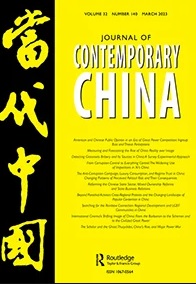
Junyang Wang
Journal of Contemporary China
Abstract: In November 2016, the Chinese Communist Party (CCP) undertook a new reform to ‘crush’ corruption by creating a sole and unified state-ranked Supervision Commission (SC). This reform incorporated the anti-corruption bureau of procuratorate into the SC, merging it with the upgraded Supervision Department of the government and the Discipline Inspection Commission (DIC) system of the CCP to address the weakness in the anti-corruption apparatus stemming from its lack of authority, as well as its internal fragmentation and redundancies. The reform was highly praised in the official media, and it gave more authority to the state’s anti-corruption agencies. However, the reform did not address the subordination of these agencies to the local DICs, which, in turn, remain significantly under the influence of the local party-state leadership through personnel, financial and operational channels. As a result, the reform has failed to free the anti-corruption apparatus from the direct influence of the leaders it is supposed to supervise. The author concludes that the reform has simply transferred power from procuratorates to the DICs, thereby strengthening the party’s direct control over anti-corruption apparatus, instead of providing additional ways to control party leaders. Therefore, the SC is unlikely to curb corruption systematically in China.
About the author: Jungyang Wang was a HYI Visiting Scholar from 2021-22.
